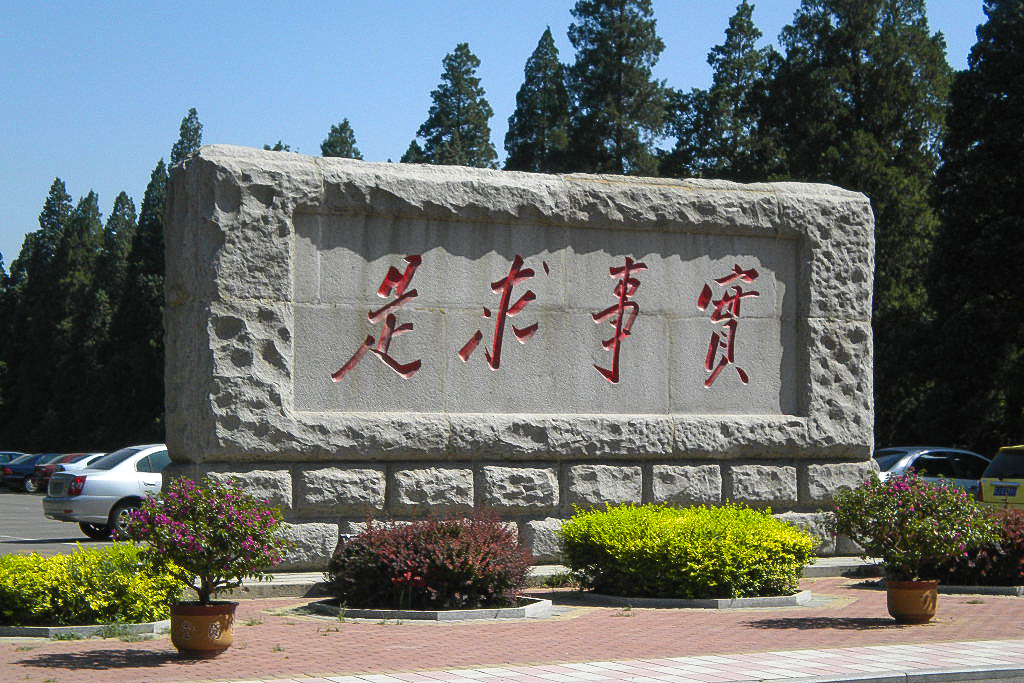Although it was Mao Zedong who first assigned a Marxist character to the concept in a speech at Yan’an in 1938, Chinese scholars have found concepts parallel to “seeking truth from facts” throughout Chinese intellectual history, drawing a consistent line of traditional pragmatic thinking from the past to the present. The phrase itself originates in the second-century CE Book of Han (漢書), which described a certain local prince “enjoyed studying the ancients, and sought truth from facts,” describing in positive terms his practical attitude toward research and study.
To “seek truth from facts,” in the Maoist sense, has its origins in Marxist dialectics. The philosophy of dialectical materialism suggests that opposing material factors work in a contradictory relationship with one another to induce development. Karl Marx later applied this theory to class conditions, suggesting that history is propelled forward by the continuous exploitation of lower classes by the dominant classes — a process which encourages struggle, leading inevitably to revolution.
As scholar Pang Laikwan has explained in a chapter on the subject, Mao differed from orthodox Soviet thinkers in his belief that “people do not act on history unidirectionally, but rather engage in a dialectical struggle with it.” Therefore, given there was no pre-determined “end” to history, Mao believed strongly in the necessity of integrating theory (理论) with practice (实践) in order to carry out the revolution in China. He condemned “dogmatic” reliance on theory alone. This meant scientifically investigating China’s social classes and conditions. The integration of “universal” Marxist principles with the “actual conditions” of the Chinese revolution represents the essence of “seeking truth from facts,” as Mao explained in a 1941 speech:
Such an attitude is one of shooting the arrow at the target. The “target” is the Chinese revolution, the “arrow” is Marxism-Leninism. We Chinese Communists have been seeking this arrow because we want to hit the target of the Chinese revolution and of the revolution of the East. To take such an attitude is to seek truth from facts. “Facts” are all the things that exist objectively, “truth” means their internal relations, that is, the laws governing them, and “to seek” means to study.
“Seeking truth from facts” also plays an important role in the Maoist principle of the “mass line” (群众路线) – a concept that Xi Jinping has attempted to revive – in that, in theory, the solicitation of public opinion contributes directly to policymaking decisions made by the Party on behalf of the people.
The slogan took on new significance under Deng Xiaoping, who introduced the related concept of “emancipating the mind” (解放思想) as China prepared to enter a new era in the late 1970s. In his 1978 speech at the third plenary session of the 11th Central Committee of the CCP, Deng heavily criticized Hua Guofeng’s “two whatevers,” emphasizing that only by “emancipating the minds” of the Chinese people from the rigid ideology of the previous era and adhering to the more pragmatic principle of “seeking truth from facts” could China achieve socialist modernization.

The return to the “party line” in the late 1970s and early 1980s was accompanied by numerous articles in the People’s Daily condemning Lin Biao the Gang of Four and as counter-revolutionary “idealists” who had “seriously damaged the mass line.” The rehabilitation of individuals who had been persecuted during the Cultural Revolution was seen as in line with the principle of “seeking truth from facts” as a return to the party line which had been abandoned.
Since Deng, China’s leaders have continued to emphasize the importance of “seeking truth from facts,” developing their own “thought” on the principle in each era. Jiang Zemin added that emancipating the mind and seeking truth from facts must “keep pace with the times” (与时俱进) as China’s market reforms advanced. Hu Jintao added “seek truth and be pragmatic” (求真务实) as part of his signature “scientific outlook on development” (科学发展观) as he attempted to address development issues like the wealth inequality gap. The Party enshrines these doctrines in its constitution as core to the Party line to which all cadres must adhere.
Xi Jinping has emphasized the importance of “seeking truth from facts” as a matter not only of ideology, but of “whether Party spirit (党性) is strong or not,” referring to a borrowed Soviet term that implies adherence to the Party’s line and priorities. According to Xi, whether or not a cadre adheres to this principle can be judged by whether they are “telling the truth, doing practical things and seeking practical results” (讲真话,讲实话,干实事,求实效). As a 2021 article in Qiushi explained, adherence to “seeking truth from facts” in this sense is not only a test of one’s political stance but also of one’s “moral quality” (道德品质) and a testament to “selflessness and disregard for personal gains and losses” — an obvious gesture to Xi’s drives to strengthen party leadership and discipline while rooting out corruption.

Jordyn Haime
The CMP Dictionary
C
D
F
G
M
N
P
S
- Scaling the Wall
- Science
- Second-Generation Reds
- Security
- Seeking Progress in Stability
- Seeking Truth From Facts
- Self-Revolution
- Seven Bottom Lines
- Six Adheres
- Smart Governance
- Sneaky Visit
- So-Called
- Socialite
- Soft Resistance
- Soul and Root
- Soundless Saturation / Quietly Nourishing
- Sovereignty
- Speaking Politics
- Streamlining Services
- Strong Cyber Power